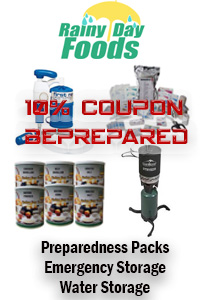Many of us have family members which walk about on 4 legs rather than two, and these critters will accompany us through thick and thin if T-SHTF. The simple fact is the our dogs, cats, and other pets are part of the family and we should prep for their needs as well as our own. Below are a few things to keep in mind when prepping for pets.
Literature. Consider picking up a few books which would assist in treating your pet should a local vet be inaccessible. A few that come to mind are the Field Guide: Dog First Aid Emergency Care for the Hunting, Working, and Outdoor Dog, The First Aid Companion for Dogs & Cats and The Merck/Merial Manual for Pet Health.
First Aid Supplies. Some basic first aid supplies (e.g. gauze, sports tape) could be used for pet first aid, other items might need to be more pet specific. Pick up a pet first aid kit which includes items recommended by the Red Cross. Many varieties of pet first aid kits can easily be found on places like Amazon.
Food. Many pets need to be on strict and consistent diets in order to remain healthy. By assuming that they will easily convert to “people food” if T-SHTF could be a mistake that could cause pets to have trouble with constipation or indigestion. Of course when there is no other alternative pets will have to eat people food, but by stocking up on large bags of pet food you can put that off for many months or even years.
Preventative Treatment. People benefit from regular checkups from the Doctor and pets can benefit from regular visits to the Vet. Consider a Pet Insurance plan which not only covers your pet (pre-SHTF) if a medical emergency happens but will also cover regular checkups, vaccinations and standard treatments. Pet insurance plans are relatively affordable, my own dogs are covered by plans offered by Banfield Pet Hospital.
The Bottom Line. Don’t forget to consider your furry friends when analyzing your prep strategy. If they are truly members of the family you will want to ensure they are taken care of and still can have some semblance of a normal life if T-SHTF. The expectations should be even higher if you have a working animal or guard dog, which will be a huge benefit to any family should things get crazy. Take care of your pets, plan for their survival and they will no doubt be around longer to take care of you.










1 comment
1 ping
generic zyrtec (cetirizine 10mg) over 50 lbs for allergies, poisons, rashes. Ascription for pain, it is aspirin coated with malox to protect their stomach, give with food. Pepto tablets (short term use only) for GI upset or prior to antibotics to settle their stomachs and generic Imodium tablets for loose stools. Scant cooked garlic in their feed once a week changes the smell of their skin and is a natural flea/tick repellant. Benadryl can be used 1mg per lb of dog weight, but is short acting, that’s why I switched to zrytec, once a day dosing.
There is a book called The Little Pill Book for Vets that is for over the counter medications that can be used on animals, a good read. I saw it on amazon.
More importantly, any injured dog must have his jaw secured with a belt or muzzle before attempting to give aid. They will snap and lung under stress no matter how well they are trained. Susie
[…] Read more at https://www.prepper-resources.com/pet-considerations-while-prepping/ […]